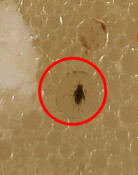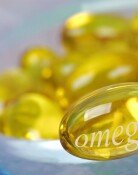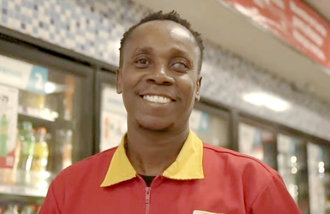[Maison&Objet] STACKUP: “Sustainable Food Storage Solutions for a Circular Economy”
[Maison&Objet] STACKUP: “Sustainable Food Storage Solutions for a Circular Economy”
Posted September. 03, 2024 16:51,
Updated September. 05, 2024 15:37
The Korea Institute of Design Promotion (KIDP) participates annually in Maison&Objet Paris, the international fair showcasing "decoration, design, and lifestyle" consumer goods. KIDP's Design Korea Exhibition Hall at the event has served as a steppingstone for small and medium-sized businesses with design excellence to reach broader exposure and market opportunities.
This year, KIDP is participating from September 5 to September 9, joined by Korean design businesses showcasing furniture, stationery, tableware, and more. In collaboration with IT Donga, we are introducing 23 design-driven small and medium enterprises participating in Maison&Objet Design Korea.
As awareness of climate change and environmental pollution grows, more people are choosing tumblers over disposable cups. However, this increased demand has led to tumblers being produced in ways that are not environmentally friendly. Ironically, the very products intended to reduce the impact of disposables are now causing environmental harm themselves.
STACKUP, an eco-friendly food container brand, is addressing this issue by using materials that minimize environmental impact. JANG Eunbi, CEO of STACKUP, explained, “Many existing tumblers are too deep and difficult to clean, which makes them impractical for long-term use. Additionally, there are too many low-quality, promotional products on the market. That’s why we decided to create durable, easy-to-clean tumblers using high-quality materials.”
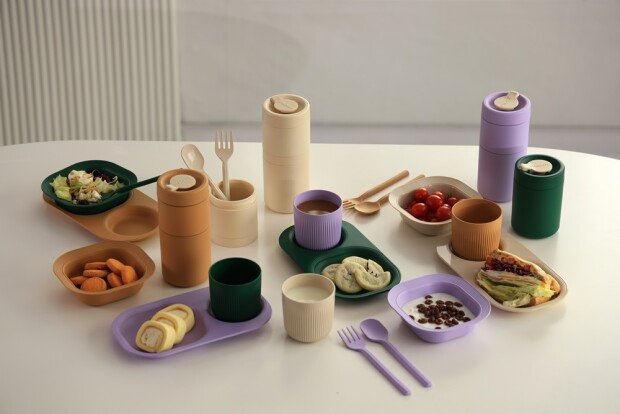 Food containers by STACKUP / Source: STACKUP
Food containers by STACKUP / Source: STACKUP
STACKUP’s flagship product, the BlockBottle, features a modular design that allows it to be assembled and disassembled like building blocks. The bottle’s capacity can be adjusted by stacking different numbers of modules, and it can be used as a tumbler, lunchbox, or for various other purposes. Additionally, the modular design makes cleaning easy, as each part can be fully separated.
Last year, STACKUP introduced a BlockBottle made from biodegradable materials. JANG Eunbi explained, “Nearly 40% of global plastic production is used for packaging and food containers. However, only about 9% of these products are recycled, while the rest end up being incinerated or landfilled.” She added, “To reduce environmental damage from incineration and landfilling, STACKUP has been developing biodegradable materials for foodware. Although these products are not disposable, the use of plastic still requires consideration of their environmental impact after disposal.”
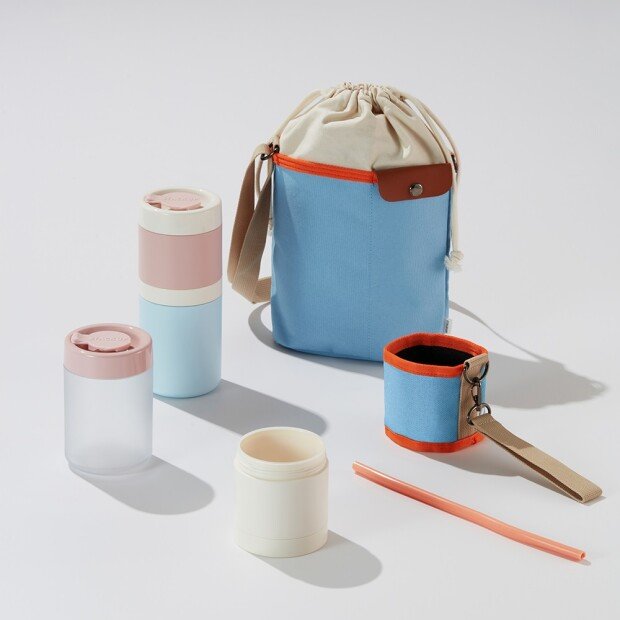 STACKUP’s flagship product, the “BlockBottle” / Source: STACKUP
STACKUP’s flagship product, the “BlockBottle” / Source: STACKUP
The ability to completely disassemble all modules and components not only makes cleaning more convenient but also ensures that each part can be individually recycled. JANG Eunbi explained, “Many everyday kitchen items and food containers are difficult to break down and must be thrown away as a whole. As a result, these items often end up in landfills or are incinerated because they cannot be properly recycled. That’s why STACKUP products are designed to be completely separable, allowing for proper recycling.”
STACKUP is set to unveil the BlockBottle at Maison&Objet, the world’s largest lifestyle consumer goods and design exhibition
JANG Eunbi expressed her excitement, saying, “I have long admired Maison&Objet and have always wanted to showcase our products there to highlight their design and quality. Unfortunately, since our products launched during the COVID-19 pandemic in 2020, we didn’t have the chance to participate until now. I’m thrilled to join Maison&Objet this year with the support of the KIDP.” She added, “Besides presenting our products, I’m excited to gain valuable insights from the other brand’s exhibits.”
She also shared her vision of evolving STACKUP into a brand that manages the entire lifecycle of its products—from development and production to sales, collection, decomposition, composting, and natural return.
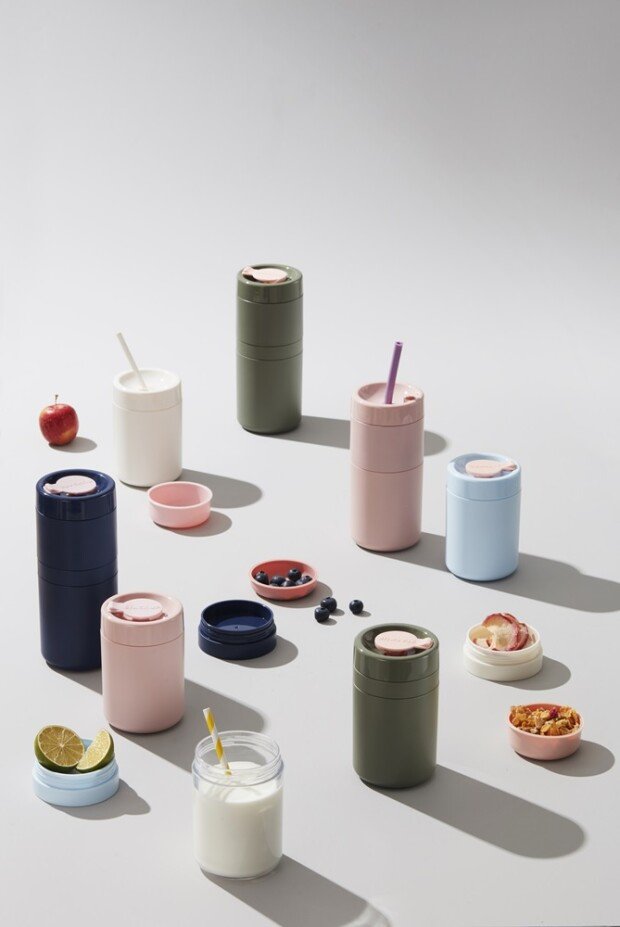 The BlockBottle can serve various purposes, such as a lunchbox or water bottle, depending on how it is assembled/ Source: STACKUP
The BlockBottle can serve various purposes, such as a lunchbox or water bottle, depending on how it is assembled/ Source: STACKUP
JANG Eunbi highlighted, “With growing interest in eco-friendly products, more items are being made from biodegradable materials. These products need composting to break down properly, but South Korea has very few composting facilities. As a result, many of these products are incinerated instead. STACKUP plans to solve this problem by setting up its own composting facilities in the future.”
She concluded, “Our goal is to provide eco-friendly products, collect them after use, eliminate them completely, and return them to the earth. This way, they can decompose and help new crops grow, which can then be used as raw materials for future products. We see this as achieving ‘complete sustainability.’”
Kwon Taek-Kyeong (tk@itdonga.com)
This year, KIDP is participating from September 5 to September 9, joined by Korean design businesses showcasing furniture, stationery, tableware, and more. In collaboration with IT Donga, we are introducing 23 design-driven small and medium enterprises participating in Maison&Objet Design Korea.
As awareness of climate change and environmental pollution grows, more people are choosing tumblers over disposable cups. However, this increased demand has led to tumblers being produced in ways that are not environmentally friendly. Ironically, the very products intended to reduce the impact of disposables are now causing environmental harm themselves.
STACKUP, an eco-friendly food container brand, is addressing this issue by using materials that minimize environmental impact. JANG Eunbi, CEO of STACKUP, explained, “Many existing tumblers are too deep and difficult to clean, which makes them impractical for long-term use. Additionally, there are too many low-quality, promotional products on the market. That’s why we decided to create durable, easy-to-clean tumblers using high-quality materials.”

STACKUP’s flagship product, the BlockBottle, features a modular design that allows it to be assembled and disassembled like building blocks. The bottle’s capacity can be adjusted by stacking different numbers of modules, and it can be used as a tumbler, lunchbox, or for various other purposes. Additionally, the modular design makes cleaning easy, as each part can be fully separated.
Last year, STACKUP introduced a BlockBottle made from biodegradable materials. JANG Eunbi explained, “Nearly 40% of global plastic production is used for packaging and food containers. However, only about 9% of these products are recycled, while the rest end up being incinerated or landfilled.” She added, “To reduce environmental damage from incineration and landfilling, STACKUP has been developing biodegradable materials for foodware. Although these products are not disposable, the use of plastic still requires consideration of their environmental impact after disposal.”

The ability to completely disassemble all modules and components not only makes cleaning more convenient but also ensures that each part can be individually recycled. JANG Eunbi explained, “Many everyday kitchen items and food containers are difficult to break down and must be thrown away as a whole. As a result, these items often end up in landfills or are incinerated because they cannot be properly recycled. That’s why STACKUP products are designed to be completely separable, allowing for proper recycling.”
STACKUP is set to unveil the BlockBottle at Maison&Objet, the world’s largest lifestyle consumer goods and design exhibition
JANG Eunbi expressed her excitement, saying, “I have long admired Maison&Objet and have always wanted to showcase our products there to highlight their design and quality. Unfortunately, since our products launched during the COVID-19 pandemic in 2020, we didn’t have the chance to participate until now. I’m thrilled to join Maison&Objet this year with the support of the KIDP.” She added, “Besides presenting our products, I’m excited to gain valuable insights from the other brand’s exhibits.”
She also shared her vision of evolving STACKUP into a brand that manages the entire lifecycle of its products—from development and production to sales, collection, decomposition, composting, and natural return.

JANG Eunbi highlighted, “With growing interest in eco-friendly products, more items are being made from biodegradable materials. These products need composting to break down properly, but South Korea has very few composting facilities. As a result, many of these products are incinerated instead. STACKUP plans to solve this problem by setting up its own composting facilities in the future.”
She concluded, “Our goal is to provide eco-friendly products, collect them after use, eliminate them completely, and return them to the earth. This way, they can decompose and help new crops grow, which can then be used as raw materials for future products. We see this as achieving ‘complete sustainability.’”
Kwon Taek-Kyeong (tk@itdonga.com)
Headline News
- Harris ‘first female president’ vs. Trump ‘again 2016’
- N. Korea builds 11-meter rampart after road demolition
- Democratic Party eventually agrees to abolish financial investment income tax
- Drug smuggling is seized twice a day on average this year
- Surrounded by ‘uniforms,’ NHL’s first female coach ‘time-out’




